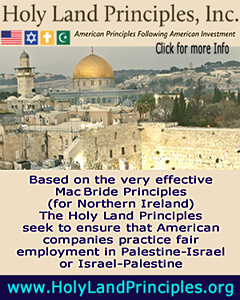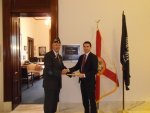
Fr. Sean Mc Manus, originally from Northern Ireland, launched the Mac Bride Principles in 1984, and the Holy Land Principles in 2012. He is president of the Capitol Hill-based Irish National Caucus and Holy Land Principles, Inc.
Fr. Mc Manus will “move ” — present and speak on — the Holy Land Principles resolution at Intel’s Annual General Meeting in Santa Clara on May 21. The Resolution calls on Intel to sign the Holy Land Principles.
He said: “The only claim Holy Land Principles, Inc. makes is that we are filling a vacuum that was crying out to be filled. We are holding all the 545 American companies doing business in Palestine-Israel responsible for their fair employment. Isn’t it extraordinary that until the Principles were launched this issue had never been raised before? Sure, a few companies involved in military activity had been called to account, but all the other companies had escaped under the radar. But now, for the first time, this is being addressed. And who could possibly object to this? What could be more reasonable and legitimate? Whatever Americans may think of the Palestine-Israel issue, all Americans expect American companies to practice fair employment. The Holy Land Principles are pro-Jewish, pro-Palestinian and pro-company. The Principles do not call for quotas, reverse discrimination, disinvestment, divestment or boycotts. The Holy Land Principles only call for fair employment by American companies in Israel-Palestine. But saying “only” in no way diminishes the vital importance of fair employment — a basic and central human right— and the most imperative duty of American companies, from which they cannot escape.”
Underrepresented Minorities
Last September Intel announced a $6 billion investment (for which it got 300 Million in government grants) in Israel, where the serious problem of “underrepresented minorities” in the hi-tech workplace has been acknowledged by such industry leaders as Cisco in their 2012 Corporate Sustainability Report: “Arab citizens constitute 20 percent of the population in Israel, but make up less than 0.4 percent of the high-tech industry workforce.” Such 50:1 inequality of outcomes for Israel’s Arab citizens, if operative instead for African-Americans, would read “Black citizens constitute 12 percent of the population of the United States, but make up less than 0.24% of the high-tech industry workforce.”
Fr. Mc Manus said: “In view of the indisputable fact that American hi-tech companies have this problem, surely signing the Holy Land Principles would be, at the very least, an expression of good faith and a first step? However, instead, Intel not only refused to sign the Holy Land Principles but also petitioned, on January 12, the Securities and Exchange Commission (SEC) to exclude our Resolution. The SEC ruled in favor of the Holy Land Principles, refusing to exclude our Resolution.
Largest Private Sector Employer
Intel is Israel’s largest private sector employer, with over 10,000 employees. Since Israel’s Occupation of the West Bank in 1967, Intel has invested $10.8 billion in plants and development centers in Israel, and received $1.5 billion in related grants (Reuters, September 22, 2014). Israel’s Finance Minister Yair Lapid said in a statement “Intel’s investment is a strategic asset for Israel’s industry…. This is the biggest investment by a foreign company ever in Israel.”
Fr. Mc Manus said: “Signing the Holy Land Principles would be the perfect way for Intel to demonstrate that their CEO, Mr. Brian Krzanich, meant what he said in his speech on January 6 to the International Consumer Electronics Show (International CES) in Las Vegas: ‘I’m here to say tonight, it’s time to step up and do more. It’s not good enough to say we value diversity and then have our workplaces and our industry not reflect the full availability and talent pool of women and underrepresented minorities.'”
Fr. Mc Manus explained: “The companies are fighting the Holy Land Principles just as they shortsightedly fought the Mac Bride Principles. However, eventually 116 American companies signed the Mac Bride Principles, having been forced to recognize that it was the proper and fair thing to do. And now the Mac Bride Principles are universally accepted as being the most effective campaign ever against discrimination in Northern Ireland. I am equally convinced that companies will come to realize that signing the Holy Land Principles is the fair and decent thing to do. It puts them on the right side of history, and it’s good for business. Furthermore, surely the companies cannot argue that Irish Catholics in Northern Ireland deserved these Principles but Palestinian Christians and Palestinian Muslims do not?”
Fr. Mc Manus concluded: “Furthermore the easiest and most transparent way for a company to convince investors, consumers and other stakeholders, that it is proud of its fair employment record is to release a statistical breakdown of its workforce according to national, racial, ethnic or religious identity. Intel should do that immediately — in a way consistent, of course, with respecting personal privacy and security.”
Fr. Sean Mc Manus, President
Holy Land Principles, Inc.
P.O. BOX 15128
Washington, DC 20003-0849
Tel. 202-488-0107 * Fax. 202-488-7537
Sean@HolyLandPrinciples.org


- Israelisnipers shooting and killing hospital workers in Gaza - December 11, 2023
- CAIR Condemns Israeli Executions of Wounded, Unarmed Palestinian in West Bank - December 11, 2023
- Arab and Muslim American voters face a “simple choice” between Biden’s inhumanity and Trump’s edgy politics - December 9, 2023
























